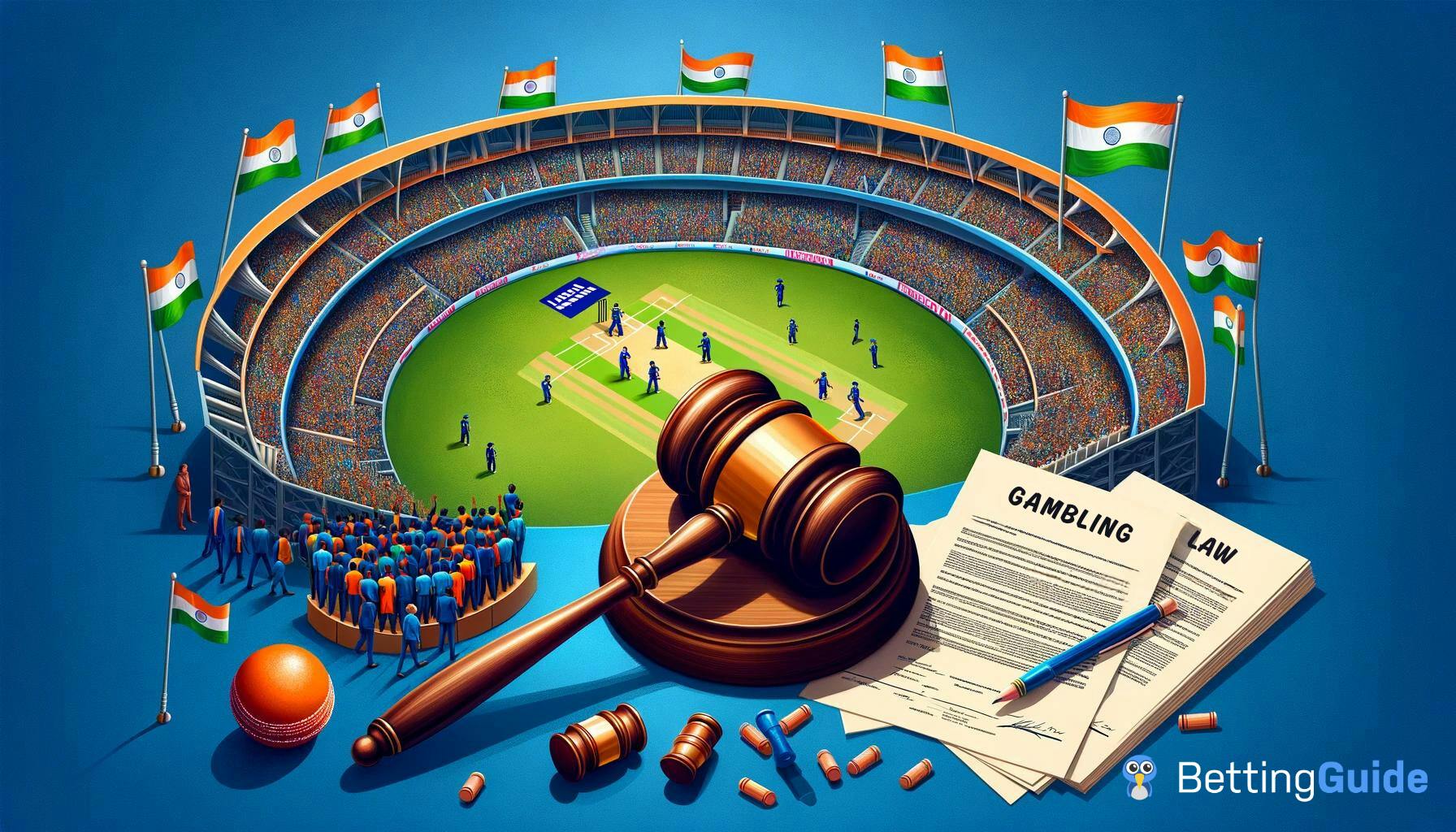Is Betting on the IPL Legal? (January 2026)

In short, IPL betting is legal for Indian players over 18 years of age. However, regulations vary by state. Online IPL betting often falls into a legal grey area, which is not explicitly illegal in many regions.
Read our guide and know your local laws before betting.
Is IPL Betting Legal Online?
To engage securely in betting on the IPL and related cricket events, it's important to heed the following recommendations:
Betting on Foreign-Based Websites
Transaction in Indian Rupees
Reporting Your Winnings
Betting on Foreign-Based Websites
Opt for platforms or real-money IPL betting apps that operate from outside India. A betting site operating outside of India is not subject to Indian regulations. However, ensure these sites are reputable and comply with international betting regulations.
Transaction in Indian Rupees
Choose online betting sites with payment methods that allow transactions in Indian rupees (INR). This is crucial because it helps adhere to FEMA regulations concerning foreign exchange and simplifies the betting process by avoiding currency conversion fees. Betting in INR is a safer, more transparent way to manage your funds.
Reporting Your Winnings
Maintaining transparency with your finances is essential by reporting any winnings from online betting. This aligns with legal and fiscal responsibilities, ensuring compliance with Indian tax laws. Proper reporting helps avoid legal complications and fines related to undeclared income.
In every other state where online betting is permitted, the platforms must be registered abroad to be deemed legal. We present our selection of the most reputable legal cricket betting sites, all based internationally, which we have thoroughly reviewed and trusted.
Top 5 Popular Legal Cricket Betting Sites

- Best Betting Platform of All Time with Exclusive Welcome Bonus👑
- Instant Deposits and Fast Withdrawals
- Minimum ₹200 Deposits via UPI, Paytm, PhonePe, and G Pay

- Superb Sportsbook with Cashbacks Partnered with Harbhajan Singh🏏
- Accepts Paytm, PhonePe, G Pay through UPI & IMPS from ₹500
- Highly Secure Platform with Crypto wallets integrated

- Crypto-focused Sportsbook with Online Chat for Players📈
- Secure & Fast Transactions Through UPI and Cryptocurrencies
- Minimum ₹500 Deposit + Instant Payments

- Accepts UPI (Netbanking), PhonePe, Google Pay and more!
- Minimum Deposit Starts at ₹100
- Top-tier Betting Apps for Android and iOS

- Great Mobile Betting Apps
- Exclusive IPL Betting Bonus
- Accepts UPI, IMPS, Google Pay, PayTM, PhonePe, Skrill and More!
Legality of IPL betting in India

Historically, the legal framework surrounding gambling in India has been primarily governed by the Public Gambling Act of 1867. This Act, established during British rule, was designed to regulate gambling practices within the country. It categorically distinguishes between games of skill and games of chance, a classification with significant legal implications.
Games of skill, which require a certain level of knowledge, expertise, or strategy, are generally considered legal and exempt from the restrictions imposed on gambling. Conversely, games of chance, where outcomes depend predominantly on luck, are typically classified under gambling and are subject to legal restrictions.
The Supreme Court of India has recognised certain games, such as rummy and horse racing, as games of skill, the classification of cricket betting under this category remains a contentious issue.
Since the IPL involves real players, teams, and matches, arguments have been made for its classification as a game of skill. And, this still needs to be resolved nationally, leaving ambiguity regarding the legality of placing bets on IPL matches online.
Furthermore, the Information Technology Act of 2000, which deals with cyber activities in India, does not provide clear guidelines on online gambling. This absence of clear legal guidance has led to the proliferation of offshore betting websites that offer services to Indian users, operating in a legal loophole. While these sites may be located outside India, they often accept Indian players and allow betting in Indian Rupees.
Evolution of Betting Laws with a Focus on the IPL
Before the IPL came into the picture, betting in India was largely governed by the Public Gambling Act of 1867. The law primarily targeted physical gambling dens and illegal betting houses.
The launch of the IPL brought a new dimension to cricket fandom in India. The massive betting market spawned by the IPL soon led to notable legal and ethical challenges. High-profile cases of match-fixing and spot-fixing involving players and team officials brought the issue of sports betting to the forefront.
In response, there were calls for a clearer legal stance on betting to safeguard the integrity of the sport.
The Justice Lodha Committee, formed in 2015 following the IPL betting and match-fixing scandal, recommended legalising sports betting under strict regulation.
The committee suggested that the government could curb illegal activities and generate substantial tax revenues by legalising the betting market. However, these recommendations still need to be fully implemented.
State-level Reactions and Online Betting Laws:
Several Indian states began revising their gambling laws to address the online betting wave. States like Sikkim and Nagaland crafted regulations to license online gaming and betting, setting a precedent for legal online gambling within Indian jurisdiction.
These were exceptions rather than the rule, as most states ignored the online aspect or lumped it in with general gambling prohibitions.
Acknowledging the digital transformation of betting activities, there has been a gradual yet noticeable shift in regulatory focus from traditional to online platforms.
While comprehensive federal legislation on online gambling remains absent, the increased incidence of online betting, especially surrounding events like the IPL, has pushed the issue up the legislative agenda.
The ambiguity surrounding online betting laws, combined with the decentralisation of gambling regulations to state governments, has led to a patchwork legal environment across the country.
As a result, while some states actively pursue legislation to address and possibly legalise online betting, others continue to adhere strictly to the prohibitions outlined in older laws.
State-specific Laws and IPL Betting

Is IPL betting legal in India? The legal landscape for IPL betting varies significantly across different states in India, leading to a complex mosaic of regulations that bettors need to navigate.
As previously mentioned, the Public Gambling Act of 1867 serves as the nationwide governing legislation for gambling.
The autonomy to regulate gambling has been delegated to the individual states by the Indian government. This allows each state to either adhere to the federal law or enact state-specific regulations to allow or forbid gambling activities.
Here's how state-specific laws impact IPL betting:
-
Sikkim:
Recognized as one of the more progressive states in terms of gambling laws, Sikkim permits licensed online betting, including on cricket. However, operators must obtain a state license to offer such services.
-
Goa:
While famous for its casinos, Goa's laws primarily focus on casino gambling. Online betting remains a grey area, with no specific state laws regulating IPL or other sports betting online.
-
Tamil Nadu:
This state has taken a strict stance against online betting, banning all forms of online gambling, which implicitly includes IPL betting. The state law penalises individuals participating in any form of online betting.
-
Andhra Pradesh and Telangana:
Both states have implemented comprehensive bans on online gambling, which extends to online IPL betting. These bans are enforced rigorously, with severe penalties for violators
-
Karnataka and Kerala:
Both states have had fluctuating stances due to legal challenges and court rulings. As of the latest updates, both have restrictions but face legal battles that could change their statuses.
-
West Bengal:
This state has more liberal attitudes towards sports betting and does not have specific laws against online IPL betting, making it relatively safer for bettors within the state.
-
Maharashtra:
Operating under the Bombay Wager Act, Maharashtra has ambiguous laws regarding online betting. The legal environment is uncertain, and IPL betting falls into a grey area.
-
Punjab and Haryana:
There are no specific laws banning online betting in these states, making IPL betting a less risky proposition. However, no formal legal framework for online betting exists either.
Financial and Safety Considerations
When participating in IPL betting, important financial and safety considerations must be remembered, especially in India's legal and financial landscape.
FEMA Regulations
Avoiding Scams
Financial Management
FEMA Regulations
The Foreign Exchange Management Act (FEMA) regulates the exchange of foreign currencies in India. For bettors, any foreign exchange transactions for betting purposes must comply with FEMA regulations. It's crucial to bet in Indian rupees (INR) to avoid legal issues related to foreign exchange violations.
Avoiding Scams
The online betting landscape is fraught with scams and fraudulent schemes. Protect yourself by conducting thorough research, avoiding offers that seem too good to be true, and never sharing personal or financial information with untrusted sources. Familiarise yourself with common scam tactics used in online betting to stay one step ahead.
Financial Management
Betting should never put your financial stability at risk. Set a budget for your betting activities and stick to it, avoiding the temptation to chase losses or bet more than you can afford. Responsible betting practices not only ensure a better gaming experience but also help prevent financial and legal troubles.
Don't Miss Out on IPL Betting Offers

IPL Betting Offers and Bonuses 2025
Parimatch, 1xBet, and 10Cric have the top IPL betting offers, bonuses, and promotions for users from India in 2025. Sign up for Parimatch India to get the best IPL betting bonus today!

IPL Online Betting Bonuses 2024 - 150% Up to ₹20,000
Compare the latest IPL online betting bonuses for 2024. We have deposit welcome bonuses for the IPL and even one no deposit IPL bonus.

I am an avid reader and passionate writer. I have been working in the content writing industry for the past 10 years now and I have written hundreds of content pieces that cover the world of gambling. With a passion for all things related to casinos, sports betting, and online gaming, I bring a unique perspective and in-depth knowledge to my pieces. From strategy guides to reviews and analysis, my goal is to provide readers with the information they need to make informed decisions and enhance their experience. Let's win big together!